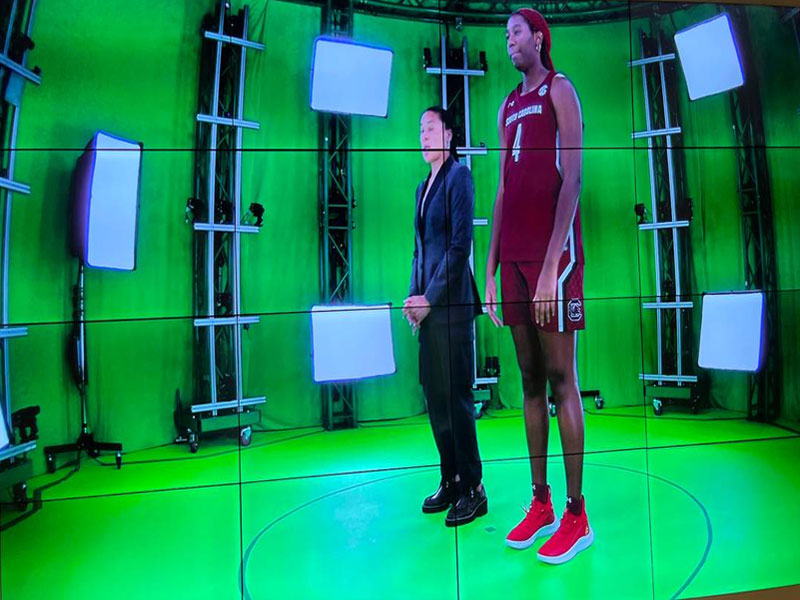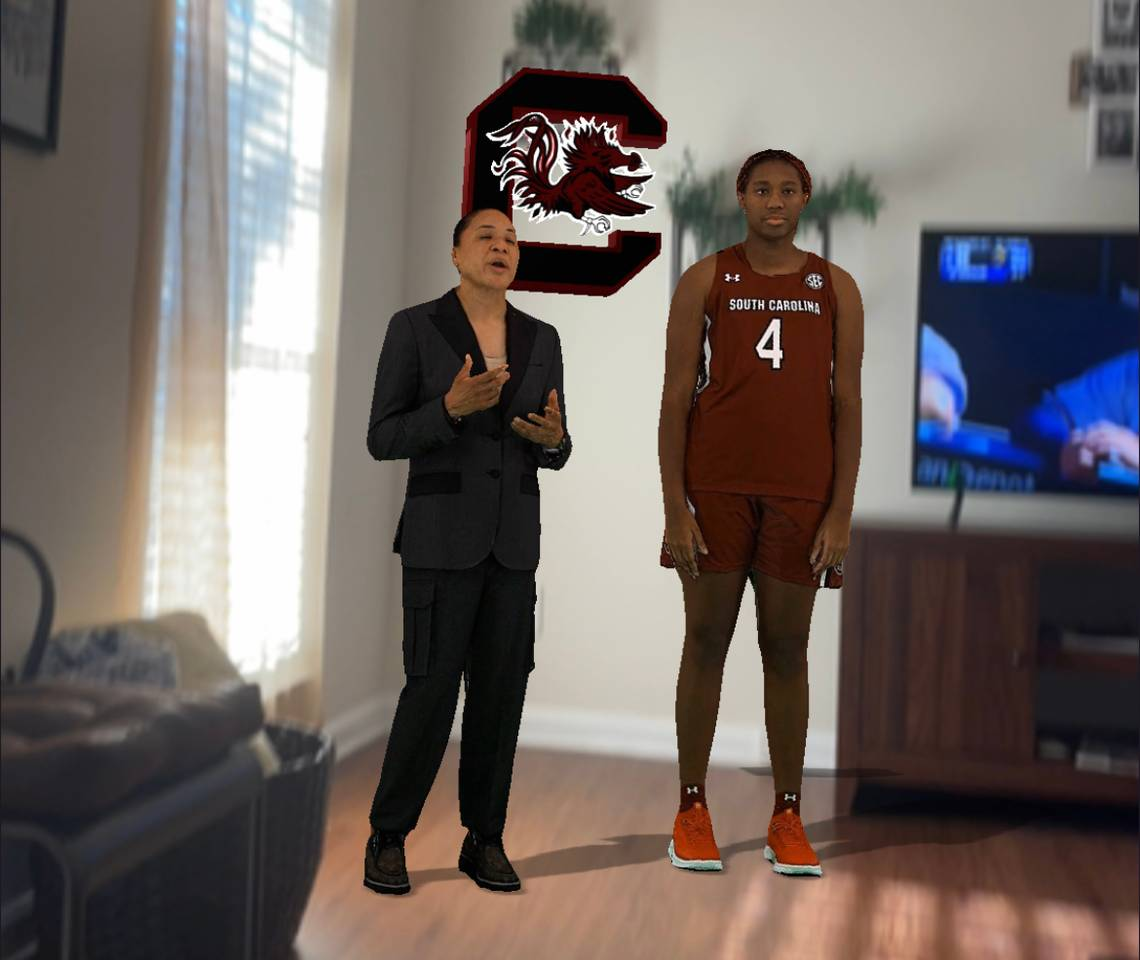Mahindra Lifespaces unveils India’s first home buying experience on the Metaverse
SOURCE: HTTPS://INDIATECHNOLOGYNEWS.IN/
OCT 31, 2023
Gamecock holograms? Why Dawn Staley, Aliyah Boston are sliding into the ‘metaverse’
SOURCE: CHARLOTTEOBSERVER.COM
OCT 22, 2021

Dawn Staley and Aliyah Boston in studio for an upcoming hologram PSA SUBMITTED PHOTO
South Carolina women’s basketball fans and people around the world will soon be able to take virtual versions of two famous Gamecocks anywhere they go.
In an augmented reality video called “Score the Shot,” holograms of USC head coach Dawn Staley and star forward Aliyah Boston will deliver a public service announcement promoting youth COVID-19 vaccinations through the camera lens of a smartphone or tablet. The PSA goes live Friday.
Users can download the video of Staley and Boston onto their smartphones or tablets using a QR code or link, and they’ll be able to view a one-minute PSA of Staley and Boston in their living rooms, homes or anywhere they can point a smartphone or tablet camera.
“We think it’s really the future of the PSA and a new way to reach new audiences that love this type of content,” said Cathy Hackl, chief metaverse officer of Futures Intelligence Group, an agency promoting virtual worlds, future technology and virtual fashion.
Hackl is an advisor to Avatar Dimension, where the PSA was filmed, housed outside of Washington, D.C. Avatar Dimension shoots “volumetric video,” a 3D performance capture, with 70 cameras to create hologram avatars of its subjects in one of the world’s five Microsoft-certified mixed reality studios.
The PSA collaboration with USC women’s basketball is the brainchild of Kathleen Hessert, CEO of strategic communication consulting company Sports Media Challenge and founder of research and consulting firm WeRGenZ. Hessert has consulted with various prominent figures in her line of work, from Shaquille O’Neal and Peyton Manning to Pope Francis and Sean “P. Diddy” Combs.
Hessert sought out prominent sports personalities for the vaccination PSA knowing the impact figures like Staley and Boston could have on young people.
“I believe that at its best, sports can change the world, that sports in service of humanity make a huge difference,” Hessert said. “I have seen in my own children and in others that a coach can be the most influential person in their lives.”
In a woman-led operation, Hessert teamed up with Hackl, Staley and Boston with the goal to promote COVID-19 vaccinations in a way appealing to Generation Z, broadly defined by Pew Research to include people born after 1996. In Hessert’s words, it’s the generation “where it’s at.”
“Because they don’t watch or read the news like older generations, we’re using the hologram and metaverse to get to them where they are and in a form that may more readily engage them,” Hessert said.
WELCOME TO THE METAVERSE
Staley’s and Boston’s holograms represent the world’s further entry into the metaverse. “Metaverse” may be a term most people aren’t familiar with today, but Hessert and Hackl agree it’s where the future is headed.
Hackl, popularly known as the “Godmother of the metaverse,” described the evolution of the internet in three phases — Web 1.0, 2.0 and 3.0. Web 1.0 was the advent of the world wide web, connecting people to information. Web 2.0 heralded social media, connecting people with each other.
Web 3.0 will connect people, places and things, Hackl said. See: Holograms.
“Sometimes these people, places and things can be fully synthetic or virtual, or sometimes they will be the real world at some level of augmentation,” Hackl said. “Think about it as like your digital lifestyle catching up to your physical lives.”
After coming up with the idea to recruit South Carolina women’s basketball for a hologram PSA, Hessert reached out to Charles Bloom, USC athletics executive associate athletics director and chief communications officer.
The pitch? Create a PSA with Staley and Boston, two of NCAA women’s basketball’s most recognizable faces, advocating for young people to get their COVID-19 vaccination. Hessert said Staley was immediately on board.
“Dawn was just so open to innovation that it was really very, very exciting to be able to bring this to her,” Hessert said. “I think the metaverse today is like social media was back in 2008, in my mind. There’s no going back. It is full throttle, and those that get on board early, and this is still early, like South Carolina women’s basketball has, they’re the ones who are going to win in the long run.”
Hessert is hopeful the Gamecocks’ engagement with the metaverse could help bring future innovation to the NCAA women’s basketball tournament. With the right sponsors, Hessert said, women’s basketball could continue to be at the forefront of technology, with investment in non-fungible tokens (NFTs) or other applications within the metaverse.
“This is a huge step forward, not just for the Gamecocks and Dawn and Aliyah, but literally for sports,” Hessert said. “I don’t know of any other hologram PSA that’s been made, and I don’t know of any other hologram as such in sports, certainly not in college sports.”

‘A MAGICAL MOMENT’ Staley and Boston flew to Washington, D.C., for their hologram shoot the day before South Carolina’s first official practice.
Before they arrived, Hackl said she gave them a “hologram stylist consultation” due to the finicky nature of the technology. Certain jewelry, shoes and colors don’t work well with the camera. Staley and Boston were told to bring several dress changes, and Staley had to change her pants because the first pair’s color didn’t show up correctly.
After a tour of the studio, test shots were done. Producers played music inside the staging area to make Staley and Boston comfortable, a mix including Lil Baby and South Carolina’s iconic “Sandstorm.”
Staley and Boston were given a chance to see their own holograms after the first test capture.
“It’s a really exciting moment,” Hackl said. “That’s where also, from a technical side, we’re looking at ‘Is there something that isn’t getting picked up correctly? Do we need to change something?’ … That’s kind of a technical moment, but it’s a magical moment, I think, for the person getting volumetrically scanned.”
Staley and Boston shot the PSA and were then able to film other small “souvenir captures,” Hackl said. One involved Staley’s recruiting phrase around birdies flying into the nest. Others captured Staley and Boston dancing.
Four hours after entering the studio, Staley and Boston were back on their way to Columbia. The hologram video spent a couple of weeks in post-production, which Hackl said includes cleaning up files and compressing them for mobile use.
Hessert said social media will play a key role in the PSA’s promotion plan. The pro-vaccination campaign featuring the Gamecocks seeks a nationwide reach.
“You’ve got to cultivate these young girls and young boys to understand how awesome women’s basketball is and what makes the Gamecocks different from any other competitor, and you’ve got to ignite this excitement in them,” Hessert said. “Well, a hologram might just do that.”
LATEST NEWS
Artificial Intelligence
Eerily realistic: Microsoft’s new AI model makes images talk, sing
APR 20, 2024
WHAT'S TRENDING


Data Science
5 Imaginative Data Science Projects That Can Make Your Portfolio Stand Out
OCT 05, 2022

SOURCE: HTTPS://INDIATECHNOLOGYNEWS.IN/
OCT 31, 2023
SOURCE: HTTPS://FINANCE.YAHOO.COM/
SEP 28, 2023
SOURCE: HTTPS://MEDIABRIEF.COM/
SEP 22, 2023
SOURCE: HTTPS://WWW.BUSINESS-STANDARD.COM/INDIA-NEWS/METAVERSE-WEB3-MARKET-TO-GROW-40-ANNUALLY-TO-REACH-200-BN-BY-2035-123060200394_1.HTML
JUN 28, 2023
SOURCE: HTTPS://WWW.WIRED.COM/STORY/WHAT-IS-THE-METAVERSE/
JUN 20, 2023